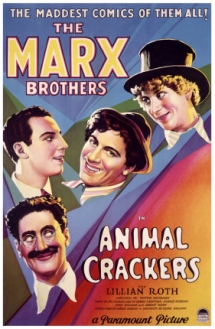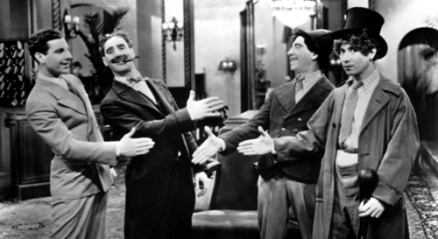 I originally wanted this post to be about the importance of unique characters. That when characters overlap, you have to cut whomever’s the most superfluous. Considering the current love of the Marx Brothers in our house, I was going to use Zeppo Marx as an example.
I originally wanted this post to be about the importance of unique characters. That when characters overlap, you have to cut whomever’s the most superfluous. Considering the current love of the Marx Brothers in our house, I was going to use Zeppo Marx as an example.
For those even more of a Philistine than me, the Marx Brothers began as a vaudeville group put together by their mother. All could sing, dance, play instruments, and verbally spar like nobody’s business. When the talkies came a’callin’, Groucho, Chico, Harpo, and Zeppo left Broadway to perform in a filmed version of Cocoanuts and four other musical comedies for Paramount. When they transferred to the MGM film studio, Zeppo dropped from the act. The films they did for MGM, most notably Night at the Opera, made boatloads of money, so therefore the loss of Zeppo must have improved the films. Right?
 Well….n-n-no.
Well….n-n-no.
Bo’s adored the Marx Brothers since the age of 6. Introducing them to the kids has been a huge treat for him. Bash in particular adores the music segments, and can even mimic Harpo’s faces during a piano duet in The Big Store:
I showed Bo my old post. He shook his head. “See, you can’t…no. Look.” He crossed his arms. Books, films, and documentaries played on fast-forward across his eyes. “It’s true that Zeppo doesn’t really stand out. You’re right that he plays the connection to the flimsy excuse of a plot in those movies. But when he’s gone, they still have a pretty boy for a lead. The three Marx Brothers are tighter as a unit, yeah, but they’re not the real stars of the movies anymore. They’re just a part of the story, and the stories suck. There’s a reason I never made you sit through Day at the Races.”
“So,” I hold off Biff and his giant metal eighteen-wheeler, “it’s the character-driven story vs. the plot-driven story?”
Bo considered. “Yes, I suppose so.” And then he went on about a lot of other nuances and exceptions, but I’ve had wine, so I don’t feel like typing all that.
The point is, even a character who doesn’t seem to stand out can have an impact on a story; it’s just that impact may not be felt until its absence. The Marx Brothers are all about fine-crafted comedy: perfectly-timed stunts, word-play that’ll make a priest blush, and music performances any obnoxious toddler will watch in blessed peace. Each Marx Brother contributed particular gifts: Groucho’s wordplay, Chico’s music, and Harpo’s innocent deviltry. While all the brothers had talents in all the corners, each picked one to dominate. Sure, Harpo played piano with Chico sometimes, and Chico sometimes sparred words with Groucho, and Groucho sometimes joined Harpo in the physical schtick, but these cross-overs never outlast the bit at hand.
And then, there’s Zeppo. He was just as talented as the other three: sing, dance, play, banter. All of it. He was a hit with them on Broadway, even though he never cared for the attention. But the triumvirate of comedy–physical, verbal, musical–were filled in by his brothers. What unique trait did he bring that they couldn’t?

The eye-candy, of course!
Yup, they made him the pretty boy character. He was the one who kept whatever passed for a story going. When he was given a chance to actually be funny, like in Animal Crackers, he’s great, but otherwise he’s just…there. Several scenes pass between Zeppo appearances in the films, and he’s never really missed. Groucho’s foil is usually Margaret Dumont, so even the straight-man role is filled. After Duck Soup and the announcement of MGM “acquiring” the comedic group, Zeppo took advantage and left the group. A tighter group should lead to tighter comedy, only it doesn’t. Why?
Because as Bo said, the MGM films don’t highlight the comedy.
Therein lies the dilemma.
MGM was all about appealing to the broadest audience possible. This meant expanding the films to be more than just Marx Brothers’ antics; the movies had to contain a stronger story and popular music numbers, too. MGM proved their point with the massive box office successes of their three Marx Brothers films, but any fan of the Paramount films can see that the Marx Brothers simply aren’t allowed to be as funny in the MGM films. Story was given priority at the sacrifice of the characters. When one looks at the Paramount films, one’ll find plots little Bash could out-write in a single afternoon. The comedy, though, is king. The four Marx Brothers have free reign with their banter, music acts, and physical antics, which makes for hilarious viewing every time. One does not watch Duck Soup for its political drama; one watches it for Chico and Groucho verbally sparring over a nut stand. One does not watch Monkey Business for the drama of gang rivalry; one watches it for Harpo driving steamship’s crew crazy.
As writers, we must always be conscious of how many characters we have in play. We must be wary of repetitive characters, of too many or too few characters. We must also remember that the changes we make with our characters can have a subtle ripple effect throughout the rest of the story. Sure, the three Marx Brothers were a tighter comedy unit, but their films did not in any way improve. The four Marx Brothers make one easily forget about the need for plot, but one’s always left wondering, “What’s with Zeppo?”
When you choose to revise your cast, think carefully what impact the absence(s) will have. Don’t just study the plot for new rips; study what binds the characters, too. The needed mending might not be noticeable at first, but once you spot it, the story won’t be the same until you make it right.
